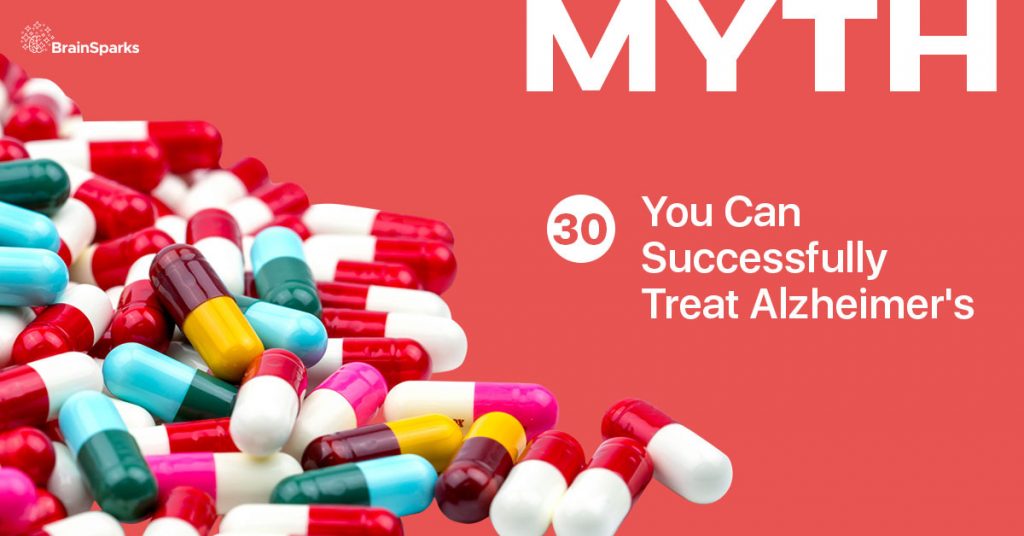No products in the cart.
Uncategorized
Dispelling 30 Myths About Dementia
September is traditionally Dementia Awareness month. We know that there are a lot of myths around dementia and many people don’t fully understand what dementia is and how it affects others. Our aim for this month is to give everyone a better understanding of dementia by dispelling a myth a day.
Myth 1: If You Forget Something, You Must Be Getting Dementia
While forgetting things is one of the signs of dementia, it’s also a common occurrence with natural ageing. There are certain signs of forgetfulness that can indicate dementia and should be checked out by a doctor.
For more information refer to this video from Share Care: https://www.sharecare.com/health/memory-loss/when-see-doctor-about-forgetfulness
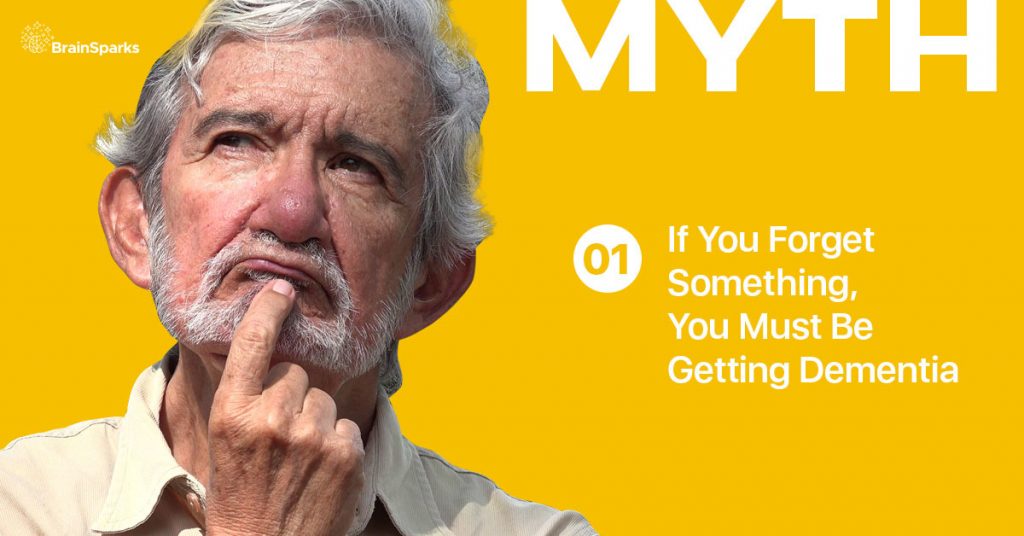
Myth 2: It’s Mean to Tell Someone They Have Dementia
Early diagnosis can help people with dementia plan for the future, and might mean they can access interventions that help slow down the disease. Being familiar with the signs of dementia can help people receive a diagnosis as early as possible. So it’s not ‘mean’ to tell someone that they have dementia, but it is important to approach the topic with care and sensitivity.
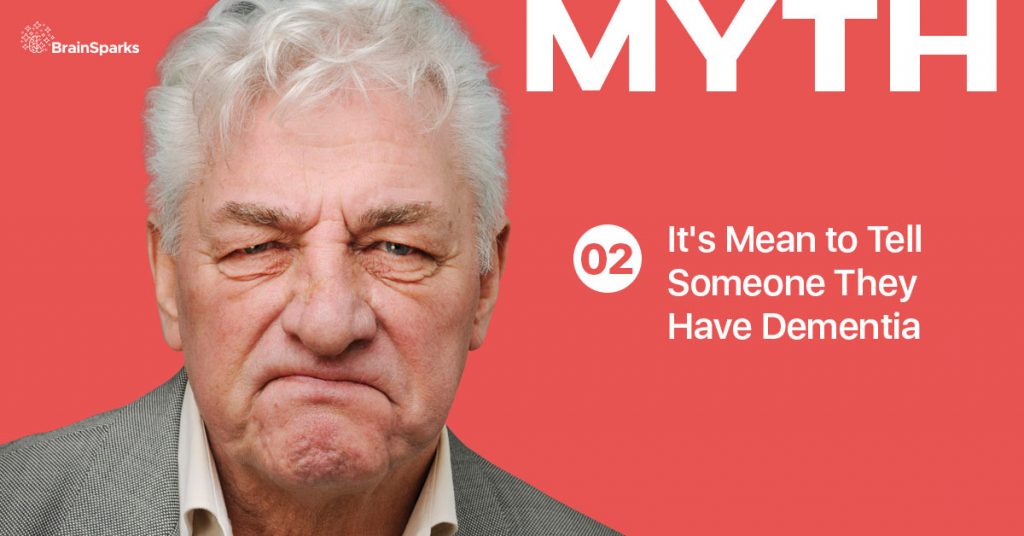
Myth 3: Memory Loss Is an Expected and Normal Part of Ageing
For most people, occasional lapses in memory are a normal part of the aging process, not a warning sign of serious mental deterioration or the onset of dementia.
This useful article from Help Guide.org provides more information: https://www.helpguide.org/articles/alzheimers-dementia-aging/age-related-memory-loss.htm
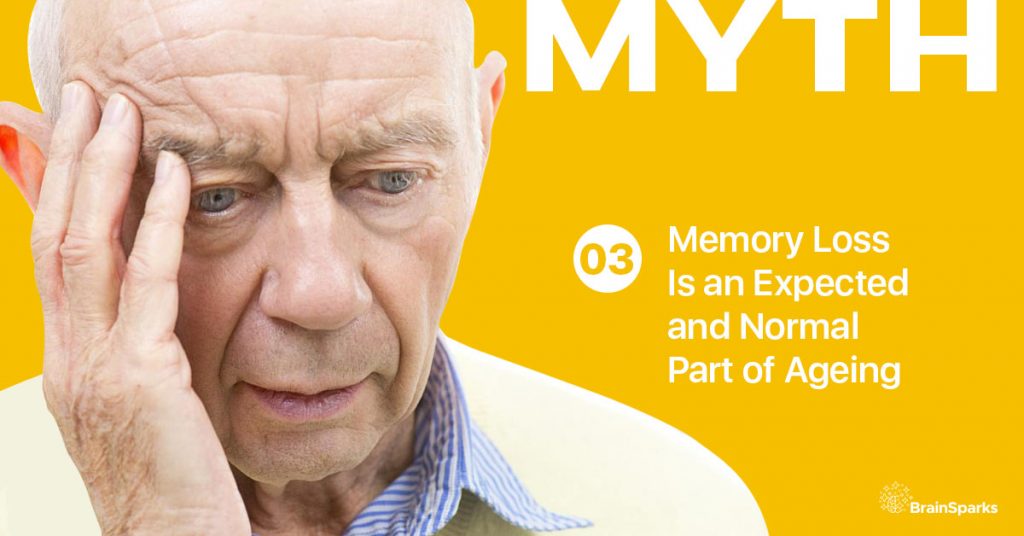
Myth 4: Visiting a Person With Dementia Isn’t Worth It
Even if a loved on has Alzheimer’s or dementia, they are likely to still enjoy having visitors. It may not always be easy, but having a great visit and understanding more about dementia is definitely worth it for both the family member and the person with dementia.
This article from Daily Caring gives some tips that can help to improve visits and encourage family and friends to visit more often: https://dailycaring.com/visiting-someone-with-alzheimers-dos-and-donts-for-visitors/
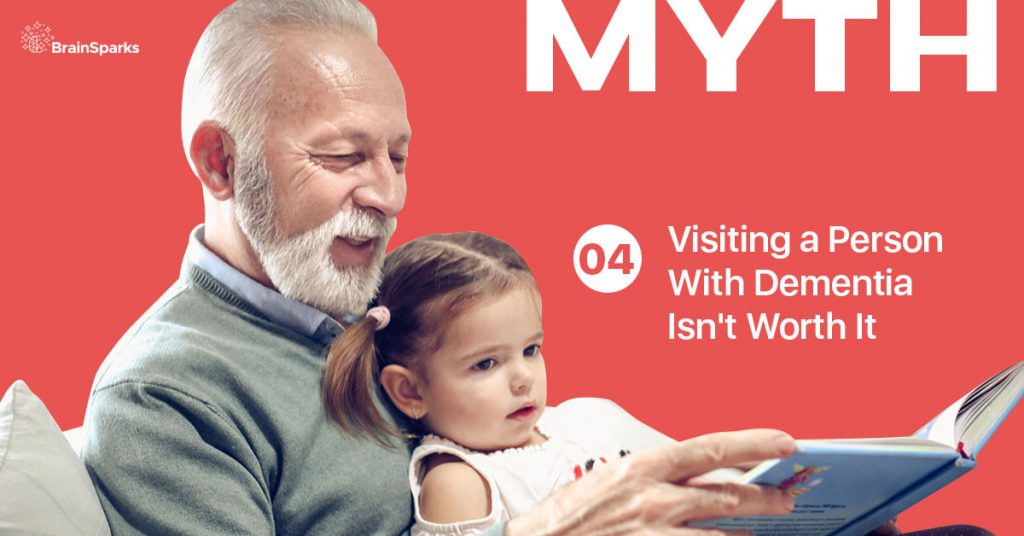
Myth 5: Only Old People Get Dementia
Dementia mostly affects older people, and the risk of dementia increases with increasing age. It is rare for someone under 65 to have dementia, but it does occur at younger ages and we call this ‘younger onset dementia’. Your genes may affect your risk of dementia.
This article from Your Brain Matters provides more information: https://yourbrainmatters.org.au/about-dementia/who-gets-dementia
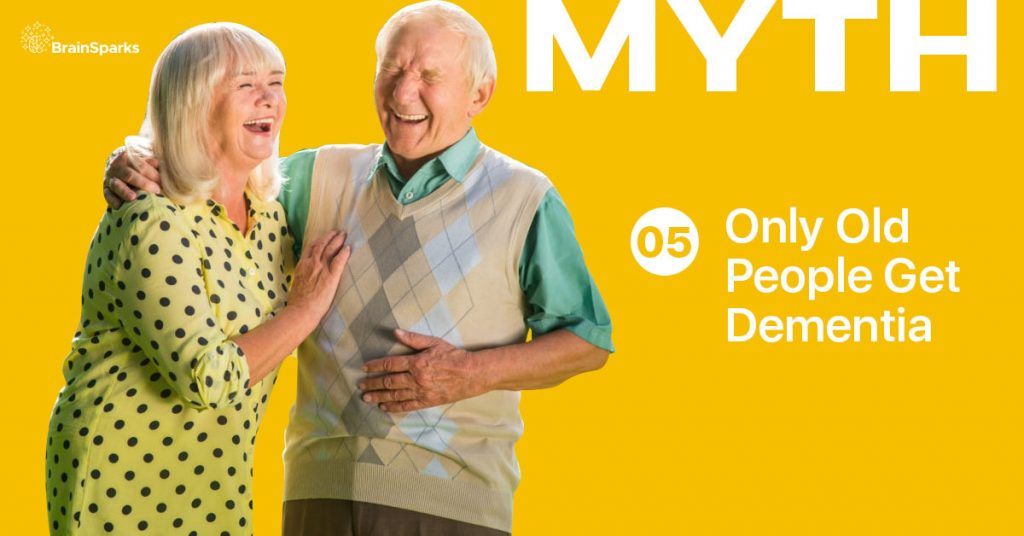
Myth 6: Your Parents Have Dementia So You Will, Too
Many people affected by dementia are concerned that they may pass on dementia to the next generations.
However, the majority of dementia is not inherited by children and grandchildren. In rarer types of dementia there may be a stronger genetic link, but these are only a tiny proportion of overall cases of dementia.
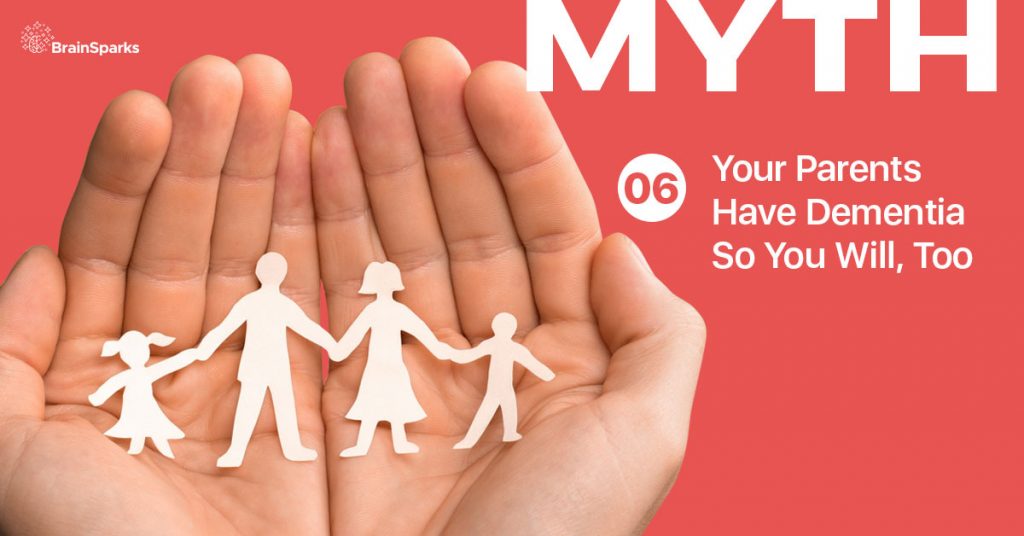
Myth 7: Flu Shots Cause Alzheimer’s
The concern that flu shots are a risk factor for Alzheimer’s originated from the late Dr. Hugh Fudenberg. Dr Fudenbeg had his medical license revoked by the South Carolina Board of Medical Examiners in 1995 for ethical misconduct. Despite this, the urban myth has persisted. However, there has been no support of his claim by any published, peer-reviewed research.
This article from Alzheimers.net dispels other common myths about risk factors for Alzheimer’s https://www.alzheimers.net/these-things-do-not-cause-alzheimers/
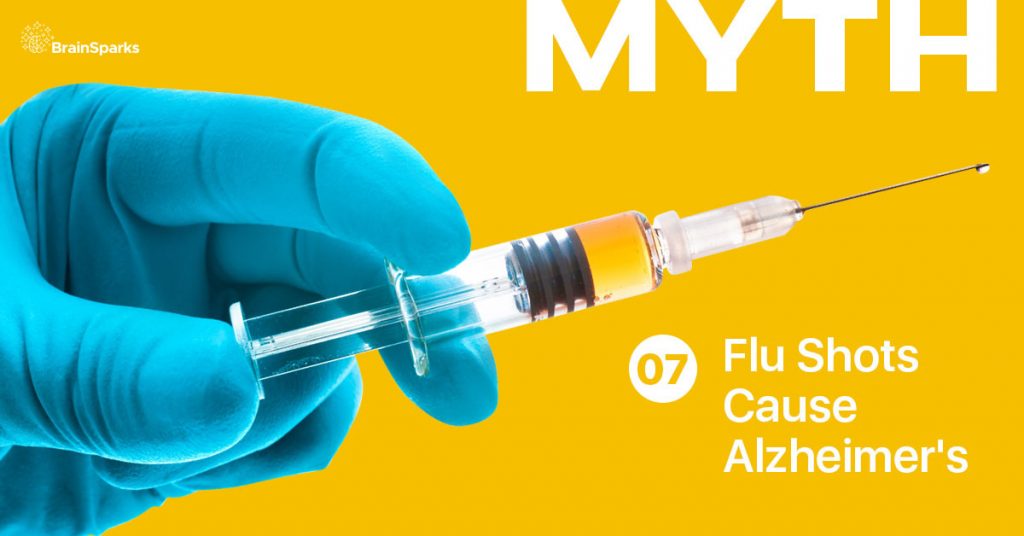
Myth 8: Coconut Oil Can Cure Alzheimer’s Disease
This claim originated based on the theory that the brain cells of people with Alzheimer’s disease are unable to use glucose to produce energy properly, and so the nerve cells ‘starve’. Some people think that coconut oil may act as an alternative energy source for the brain.
However, it’s important to be aware that there is not enough scientific evidence to know whether this is the case.
See this link for more information: https://www.alzheimers.org.uk/about-dementia/treatments/alternative-therapies/coconut-oil-and-dementia

Myth 9: There’s No Point Seeing Someone With Dementia as They Won’t Know You Were There
Visiting with someone who has Alzheimer’s disease can be emotionally and physically draining. However, the Alzheimer’s Society encourages family and friends to remain a part of their loved ones’ lives as it can help them to experience a strong emotional memory and long-lasting benefits from socialising.
This article from Next Avenue gives useful tips for visiting someone with dementia: https://www.nextavenue.org/visiting-someone-dementia/
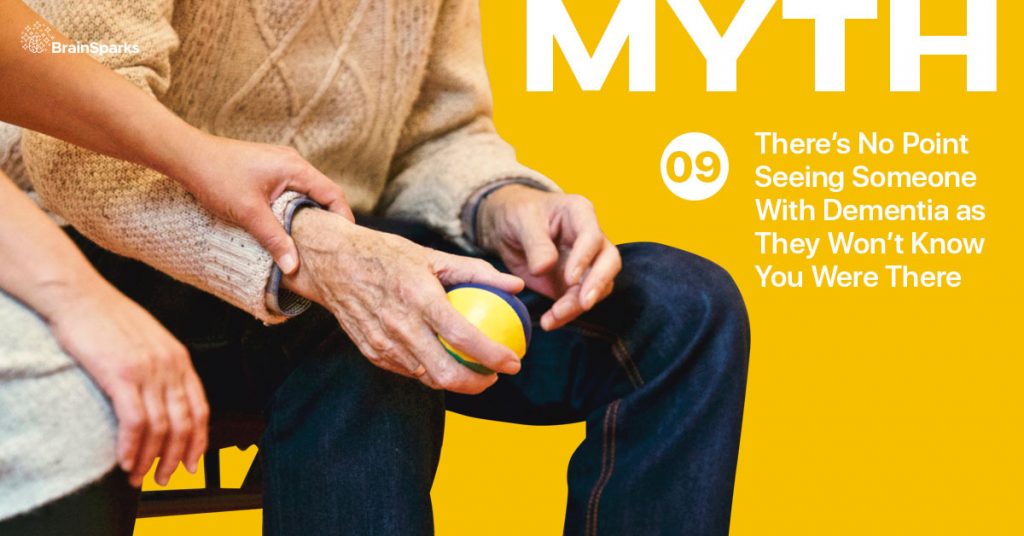
Myth 10: People With Dementia Become Like Children and Respond Well to Being Treated That Way
People with dementia are not children and should never be treated as such.
Thinking that a person with dementia becomes like a child is dangerous as it affects a person’s entire attitude and the way that they speak to and interact with the person with dementia. The problem with this approach is that the person with dementia is likely to be aware that you are talking down to them and respond with strong disapproval or anger.
Remember that there is a huge difference between children and people with dementia. People with dementia have lived a long life and have a huge amount of life experience, history and wisdom, unlike a child.
Remembering these differences can help you keep people with dementia in high regard and maintain your respect for them.
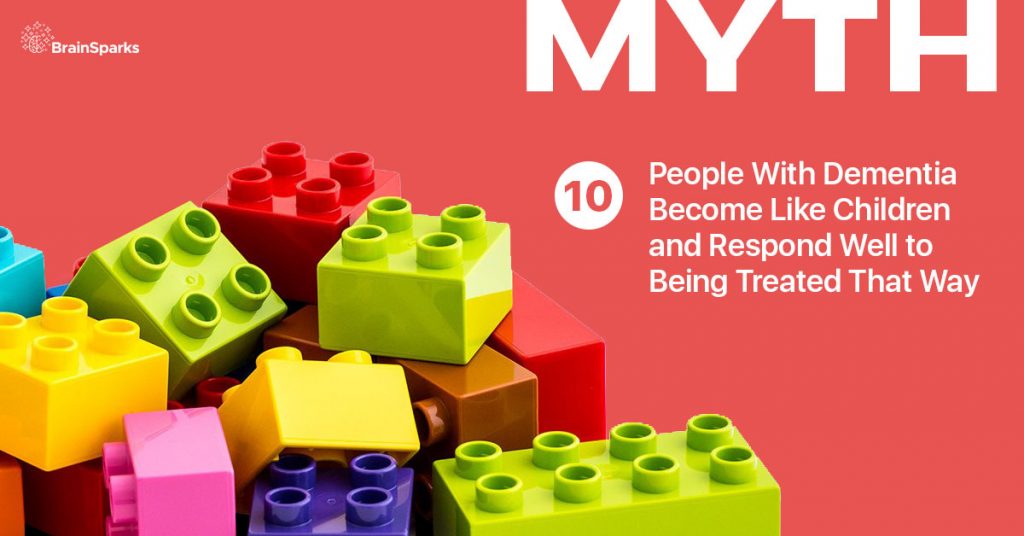
Myth 11: Scientists Don’t Want to Find a Cure for Dementia Because They’re Making Money From the Disease
Researchers around the world are constantly working to develop effective treatments for dementia, and hope to eventually to find a cure.
Most of this work is focussed on Alzheimer’s disease, the most common form of dementia. While there is currently no cure for Alzheimer’s disease, there are medications available that can reduce symptoms and improve quality of life for some people with dementia. To date, however, there is no available medication that can stop the progress of the disease.
For more information on some of the treatments for Alzheimer’s that may eventually lead to a cure, check out the following link from DementiaAustralia: https://www.dementia.org.au/about-dementia/dementia-research/dementia-treatments-and-cure
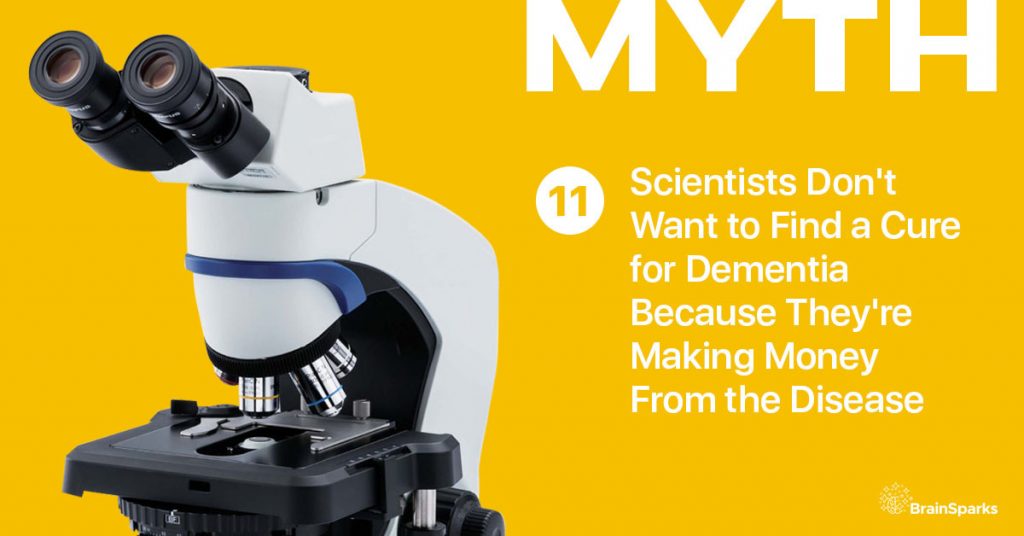
Myth 12: Aspartame Causes Alzheimer’s
Aspartame was approved for limited use by the U.S. Food and Drug Administration (FDA) in 1981. In 1996 approval was expanded to use in all foods and beverages. Since then, people have raised concerns about a possible link between the aspartame and memory loss. However, FDA scientists continue to review all data and have concluded that aspartame is safe for the general population, with the exception of those who have phenylketonuria, a rare genetic disease.
For more information on the legal use of aspartame, check out the following link: https://www.fda.gov/Food/IngredientsPackagingLabeling/FoodAdditivesIngredients/ucm397725.htm
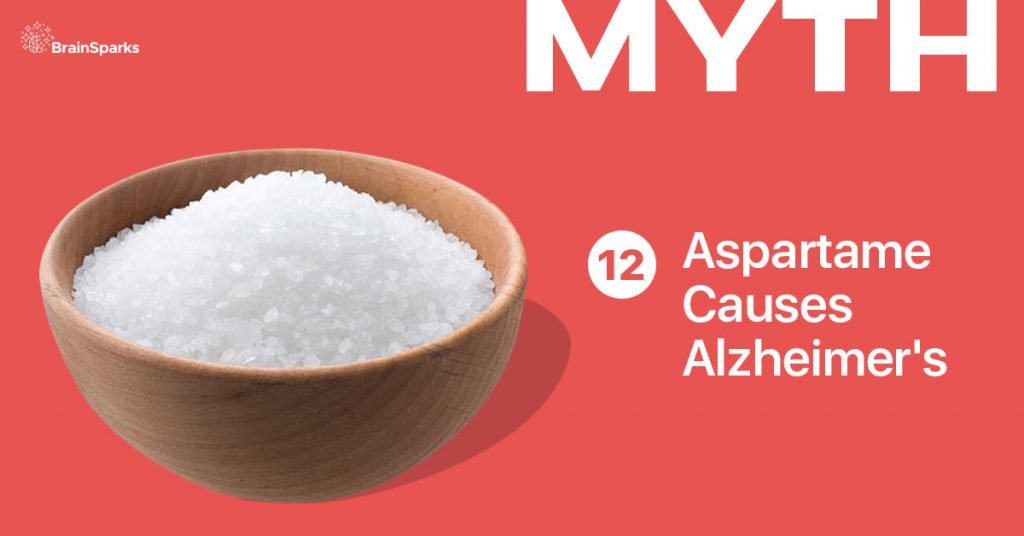
Myth 13: There are Currently No Medications to Treat Alzheimer’s
A number of drugs are currently available in Australia for use by people with dementia. These drugs fall into two categories, cholinergic treatments and Memantine.
Cholinergic treatments offer some relief from the symptoms of Alzheimer’s disease for some people for a limited time. Memantine targets a neurotransmitter called glutamate that is present in high levels when someone has Alzheimer’s disease.
There are also medications available to deal with the behavioural and psychological symptoms that can occur as a result of dementia, such as depression, anxiety, sleeplessness, hallucinations, ideas of persecution, misidentification of relatives or places, agitation and aggressive behaviour.
Your doctor or gerontologist will be able to talk to you about whether medications will be suitable.
Find out more here: https://www.dementia.org.au/national/about-dementia/how-is-dementia-treated/drug-treatments-and-dementia
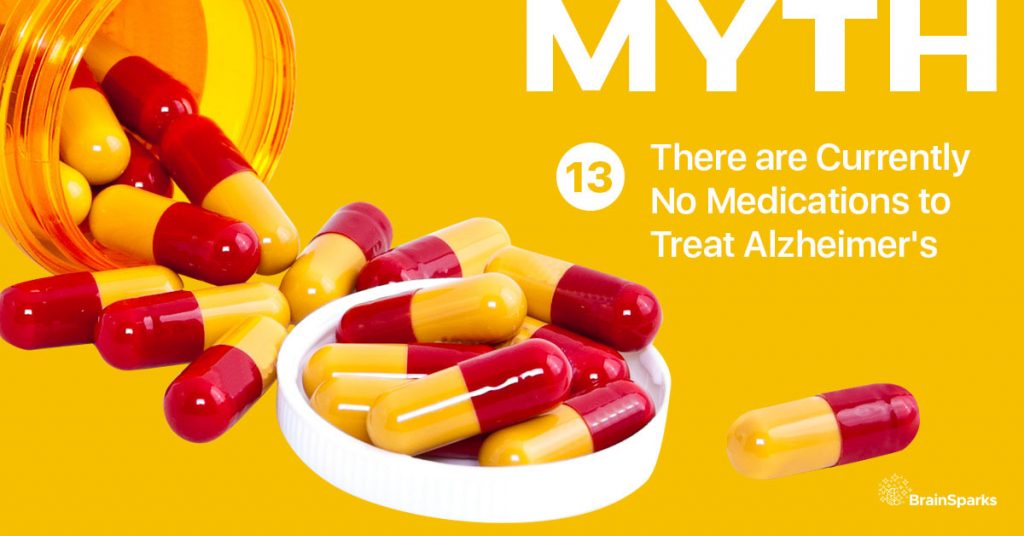
Myth 14: There’s No Use Going to the Doctor about Dementia Because Nothing Can Be Done
Dementia is a life-changing condition and a person’s reaction to the diagnosis can range from dismay and deep sadness to anger and despair. For many people, a diagnosis can provide long-awaited answers for their failing memory, communication problems and changes in behaviour.
In addition, an early diagnosis can open the door to future care and treatment. It helps people to plan ahead while they are still able to make important decisions on their care and support needs and on financial and legal matters.
Find out more from Social Care Institute Page https://www.scie.org.uk/dementia/symptoms/diagnosis/early-diagnosis.asp
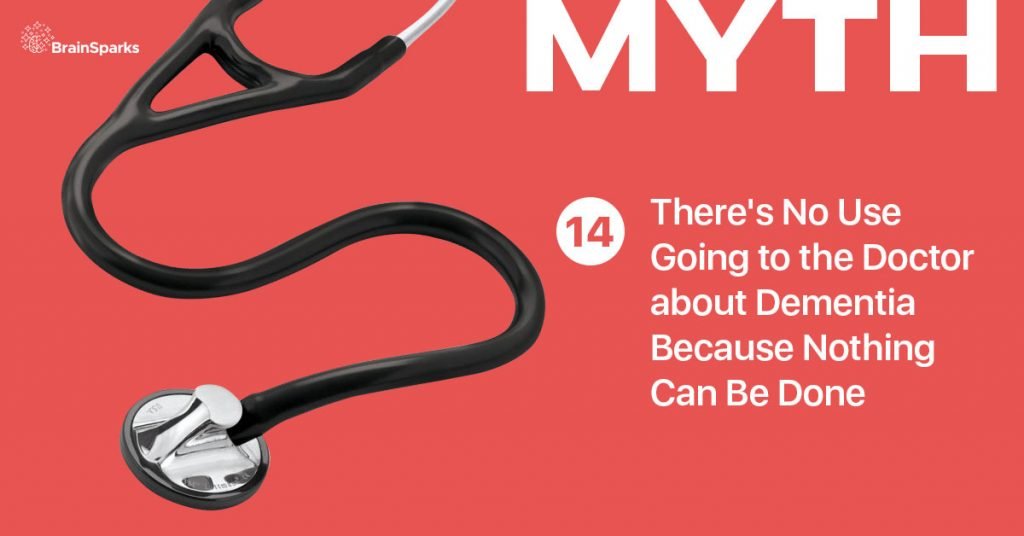
Myth 15: Vitamins and Supplements Can Prevent Dementia
A new review from Cochrane looked at the effects of vitamin and mineral supplements on cognitive function. Despite being able to include 28 studies involving more than 83,000 people, there were limitations of the evidence, which meant that confident conclusions could not be drawn.
This blog looks deeper into the report and the latest evidence on vitamin and mineral supplements for preventing dementia, or at least slowing cognitive decline:
https://www.cochrane.org/news/preventing-dementia-do-vitamin-and-mineral-supplements-have-role

Myth 16: You Can Prevent Dementia
There’s no certain way to prevent all types of dementia, and researchers are still looking into how the disease develops.
There is, however, good evidence that a healthy lifestyle can help reduce someone’s risk of developing dementia when they are older. It can also help prevent cardiovascular diseases, such as strokes and heart attacks, which are both risk factors for Alzheimer’s disease and vascular dementia, the most common types of dementia.
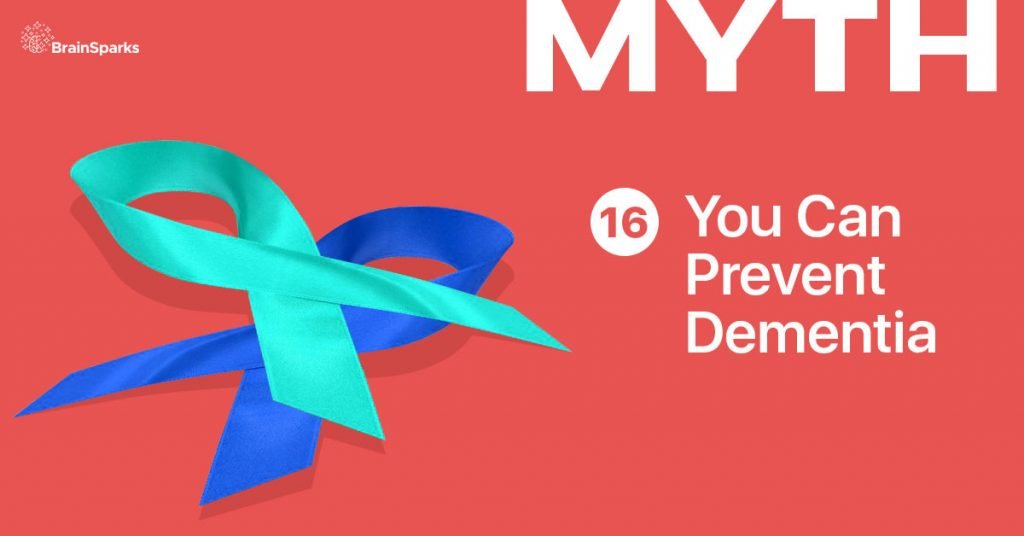
Myth 17: Dental Fillings Cause Alzheimer’s
Over the last few decades, there has been growing concern about a link between Alzheimer’s and silver dental fillings. These fillings are made of a mixture of mercury, silver and tin, the latter of which can be toxic. However, the Alzheimer’s Association strongly believes that there is no relationship between dental fillings and Alzheimer’s disease. In addition, the World Health Organization endorses the safety of the mixture of mercury, silver, and tin for dental restorations.
It’s important not to fall prey to myths and misinformation about dementia. If you are concerned about your risk of dementia, speak to a medical professional who can help you to understand the legitimate risk factors.
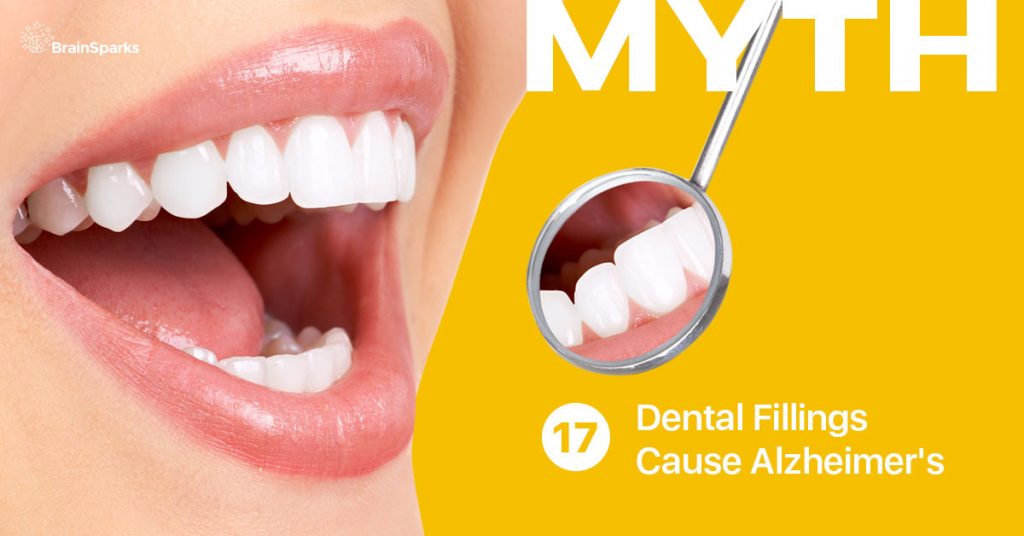
Myth 18: Drinking out of Aluminium Cans Can Cause Dementia
Aluminium was identified as a possible cause of Alzheimer’s in the 1960s and 1970s. This led to concern about exposure to aluminium in every day sources such as pots and pans, beverage cans, antacids and antiperspirants.
However, since then, studies have not confirmed any role of aluminium in causing Alzheimer’s. Today, experts focus on other areas of research, and few believe that everyday sources of aluminium pose any threat.
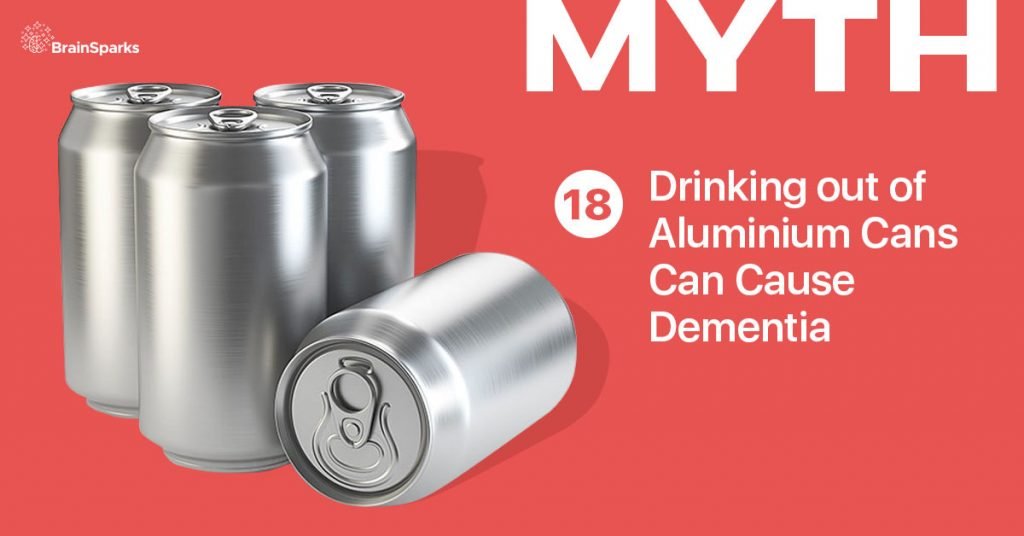
Myth 19: You Have to Watch All People With Dementia Closely or They Will Wander Off
Wandering is a common behaviour in people with dementia, however, not everyone will wander, and you definitely don’t have to watch them all the time.
6 in 10 people with dementia will wander. A person with Alzheimer’s may not remember their name or address, and can become easily disoriented, even in places that are familiar to them. Wandering among people with dementia is undoubtedly dangerous, but there are strategies and services to help prevent it.
Find out more about wandering in dementia here: https://www.alz.org/help-support/caregiving/stages-behaviors/wandering
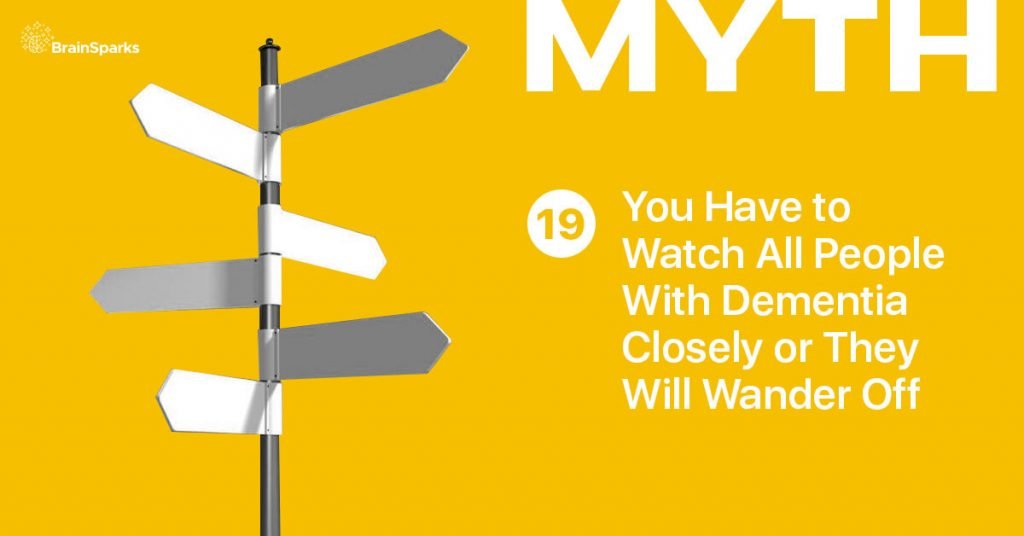
Myth 20: A Diagnosis Of Dementia Means Life Is Over
While a diagnosis of dementia will certainly impact your life, it is by no means over. The definition of quality of life is different and deeply personal. Whatever your definition, it’s important to remember that you can still enjoy the things that you always have once you have learned that you have dementia.
People with mild to moderate symptoms may need support in finding opportunities to enhance their quality of life. As dementia progresses, preserving the quality of life of the person may require more consideration for social and physical environments.
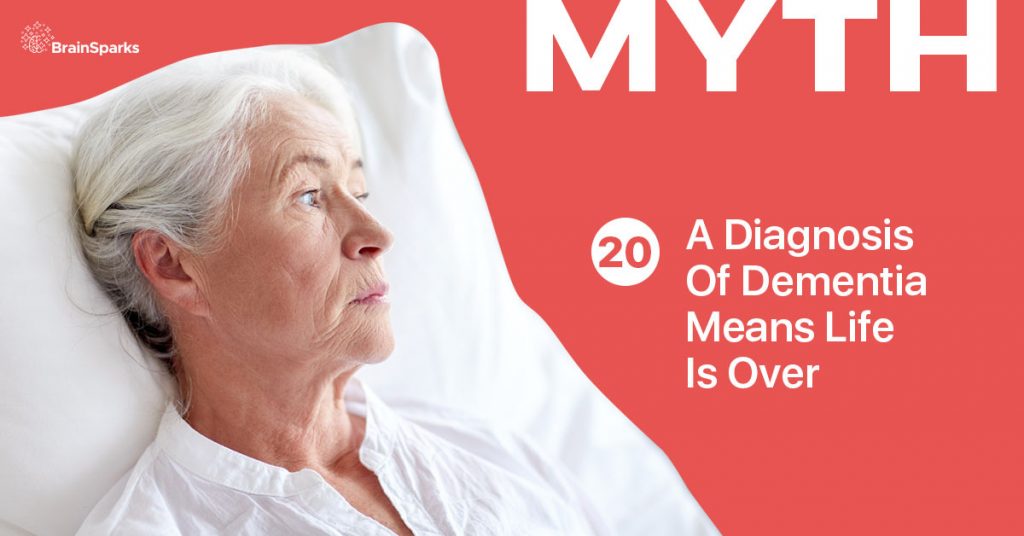
Myth 21: People With Dementia Do Not Understand What Is Going On Around Them
There are differing opinions amongst medical experts on how much someone with advanced dementia of any type understands.
More information on this can be found in this article from Aging Care: https://www.agingcare.com/articles/alzheimers-dementia-understanding-surroundings-145266.htm
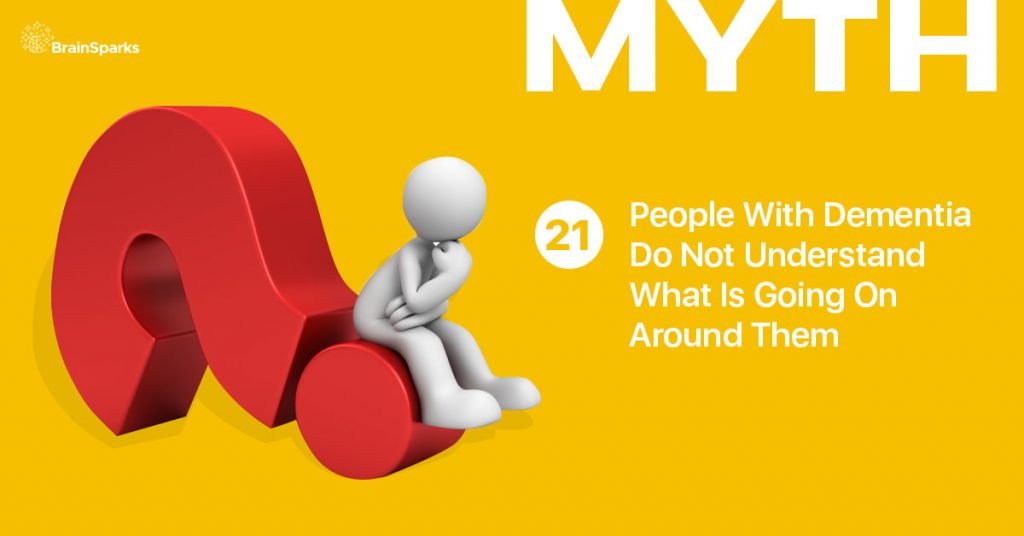
Myth 22: Early Diagnosis of Dementia Is Not Beneficial
If you are experiencing symptoms that you think might be due to dementia, it’s important to seek medical advice. Getting checked by your doctor can help determine if the symptoms that you have are due to dementia or a different condition.
An early diagnosis allows you:
- Access to treatment options
- An opportunity to participate in clinical trials
- A chance to prioritize your health
- Emotional and social benefits
- More time to plan for the future
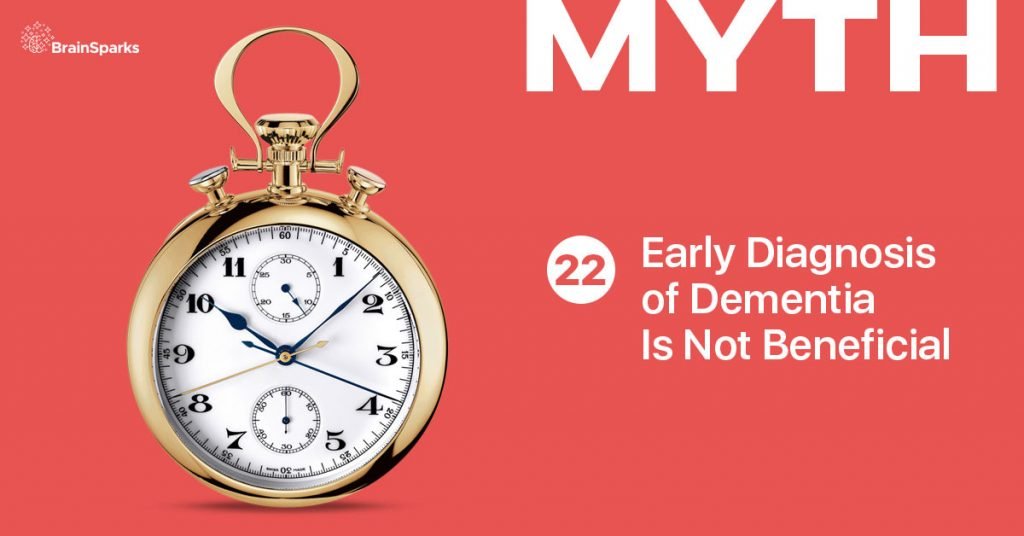
Myth 23: All People Who Have Dementia Become Violent And Aggressive
People with dementia may sometimes behave in a way that is physically or verbally aggressive. Alzheimers Society UK shares insight into why this may be the case and practical tips for dealing with this type of behaviour: https://www.alzheimers.org.uk/about-dementia/symptoms-and-diagnosis/symptoms/aggression-and-dementia

Myth 24: People Who Have Dementia Cannot Communicate What They Want
Losing the ability to communicate can be one of the most frustrating and difficult problems for people with dementia, as well as their families and carers. A person with dementia will typically experience a gradual decline in their ability to communicate as the illness progresses. They will often find it more and more difficult to clearly express their own thoughts and feelings, as well as to understand what others are saying.
This information from Dementia Australia details the changes in communication that are likely to occur as dementia progresses: https://www.dementia.org.au/national/support-and-services/carers/managing-changes-in-communication
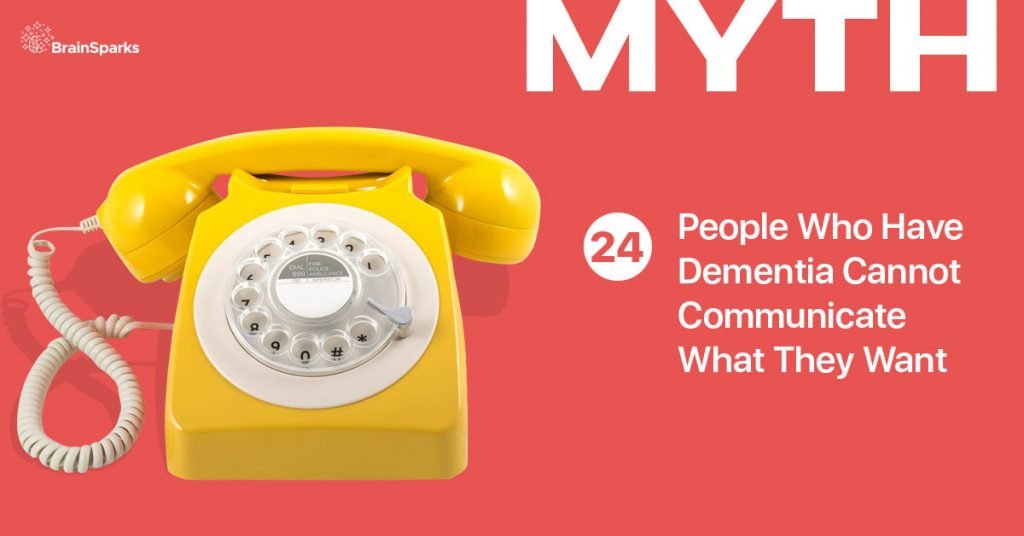
Myth 25: Cooking with Aluminium Pans Causes Alzheimer’s
This post from Psychology Today says it all … ‘Keep the Aluminium Cookware, Your Brain Won’t Mind’ https://www.psychologytoday.com/au/blog/your-brain-food/201105/keep-the-aluminum-cookware-your-brain-won-t-mind
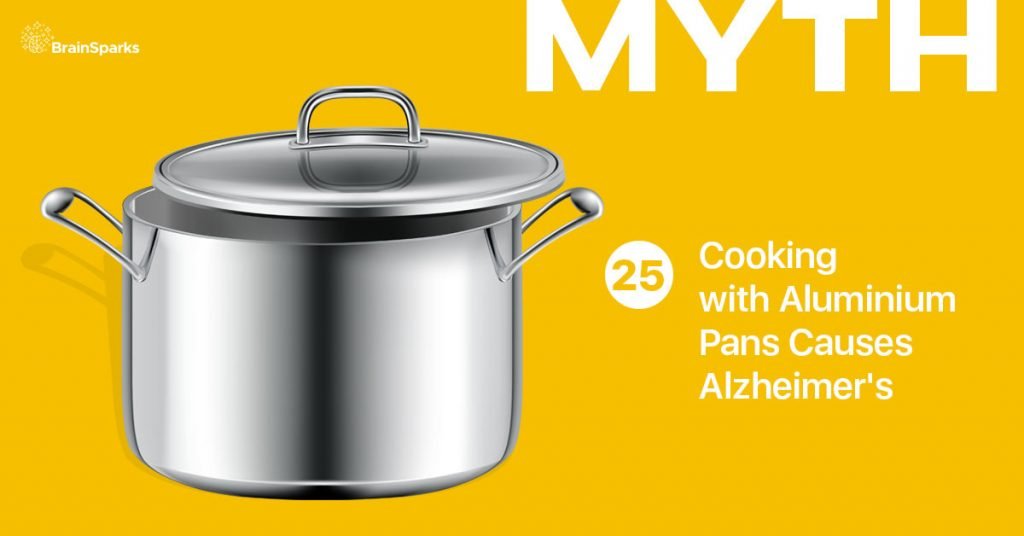
Myth 26: When Someone Has Dementia They Become a Completely Different Person
A person with dementia is likely to experience behaviour and personality changes. They will often act in ways that are uncharacteristic or become far removed from their “old self. These changes can be particularly difficult for family and friends to deal with.
Behaviour changes occur for many reasons. With dementia, it is usually because the person is losing neurons (cells) in parts of their brain. The behaviour changes that are seen will depend on which part of the brain is losing cells. Behaviour can also change due to medical issues, such as pain or infection or the medication that the person is taking to treat dementia.
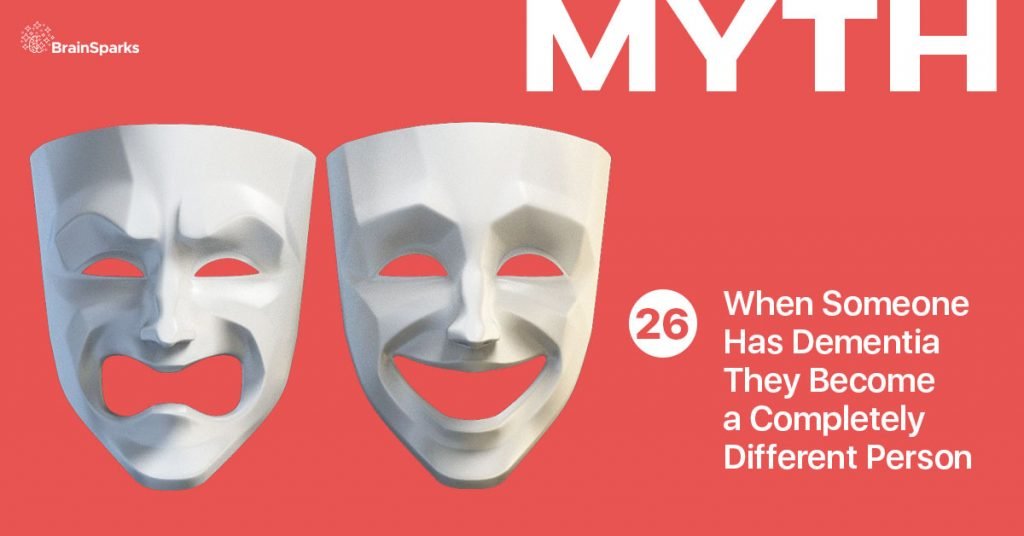
Myth 27: Memory Boosters Can Prevent Dementia
Memory loss is a worry for many people as they age, particularly those that are concerned about developing Alzheimer’s.
WebMD spoke with medical experts to find out whether, and which, memory enhancers really work: https://www.webmd.com/diet/features/fortifying-your-memory-with-supplements#1
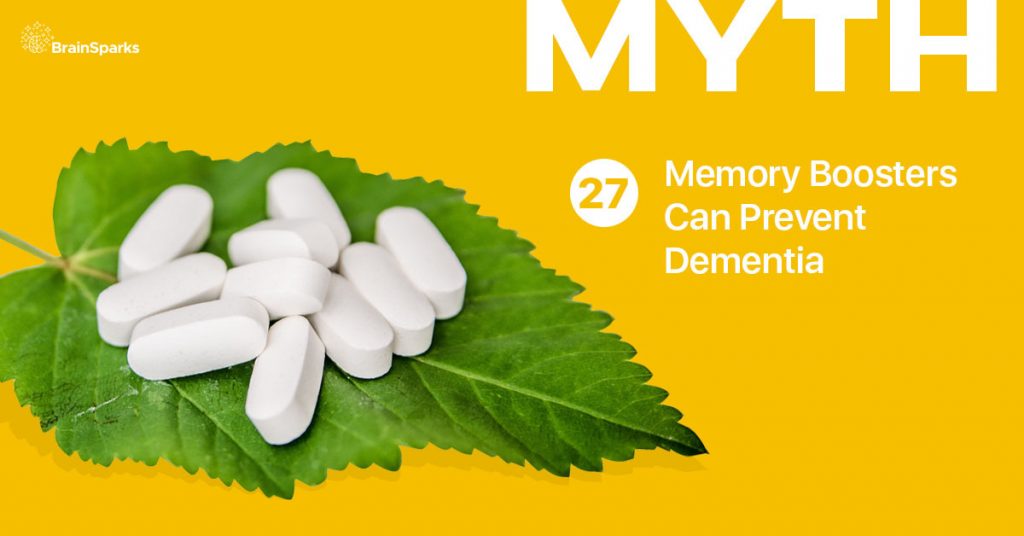
Myth 28: Life Isn’t Worth Living If You Have Dementia
Some people think that once a person is diagnosed with dementia, they are no longer capable of doing the normal activities that they once did.
However, in reality, people in the earlier stages of dementia can do a lot of the things that they’ve always done. As dementia progresses, they may need more supervision and help to ensure they are staying safe. This doesn’t mean that they can’t continue to function and be happy for the majority of the time.
Read more about enhancing the quality of life for someone with dementia in this article from Lakeside Manor Memory Care: https://lakesidemanor.org/quality-life-dementia-patients/
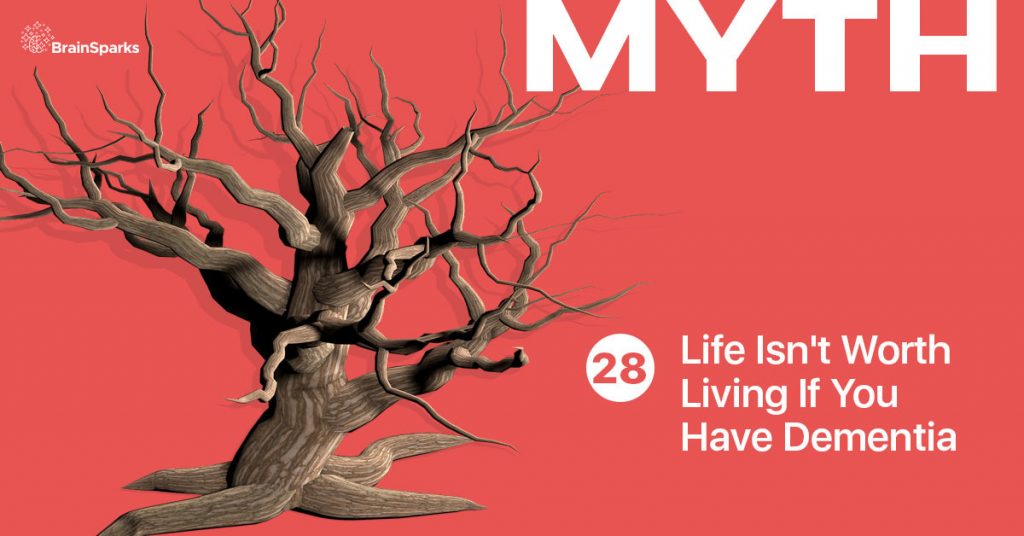
Myth 29: Alzheimer’s Disease Is Worse Than Dementia
People often get confused with the difference between dementia and Alzheimer’s disease. The term ‘dementia’ is an overall term used to describe declining cognitive ability that impacts how you live your daily life. Symptoms can impact memory, performance of daily activities, and ability to communicate. Alzheimer’s is the most common type of dementia.
Although symptoms of the two conditions may overlap, distinguishing them is important for management and treatment.
This article from Healthline gives more in-depth information to distinguish the two: https://www.healthline.com/health/alzheimers-disease/difference-dementia-alzheimers#outlook
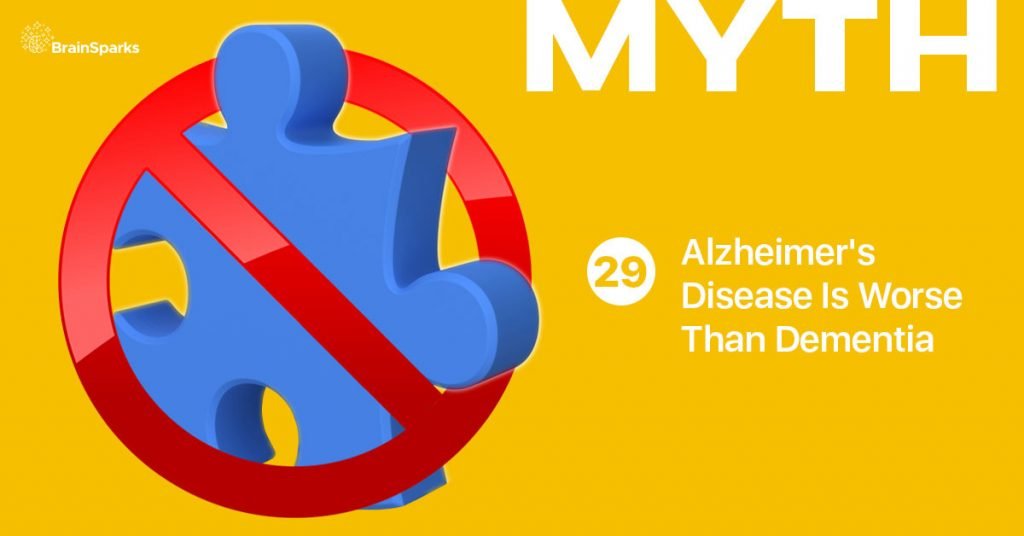
Myth 30: You Can Successfully Treat Alzheimer’s
While there is no cure, prevention or treatment to slow the progression of Alzheimer’s disease, there are prescription medications that can be used to treat its symptoms.
Read more from Alzheimers Association: https://www.alz.org/help-support/i-have-alz/treatments-research
